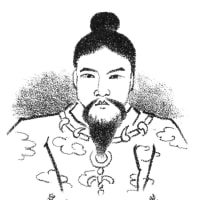『日本書紀』継体天皇 26
冬十月、調吉士至自任那、奏言「毛野臣、爲人傲恨、不閑治體、竟無和解、擾亂加羅、倜儻任意而思不防患。」故、遣目頰子、徵召。目頰子、未詳也。是歲、毛野臣、被召到于對馬、逢疾而死。送葬、尋河而入近江。其妻歌曰、
比攞哿駄喩 輔曳輔枳能朋樓 阿苻美能野 愷那能倭倶吾伊 輔曳符枳能朋樓
目頰子、初到任那時、在彼鄕家等、贈歌曰、
柯羅屨儞嗚 以柯儞輔居等所 梅豆羅古枳駄樓 武哿左屨樓 以祇能和駄唎嗚 梅豆羅古枳駄樓
廿五年春二月、天皇病甚。丁未、天皇崩于磐余玉穗宮、時年八十二。冬十二月丙申朔庚子、葬于藍野陵。或本云「天皇、廿八年歲次甲寅崩。」而此云廿五年歲次辛亥崩者、取百濟本記、爲文。其文云「太歲辛亥三月、軍進至于安羅、營乞乇城。是月、高麗弑其王安。又聞、日本天皇及太子皇子、倶崩薨。」由此而言、辛亥之歲、當廿五年矣。後勘校者、知之也。
≪英訳≫
In the winter, during the tenth month, the envoy Tsukino no Kishi arrived from Mimana and reported, “Minister Kena is arrogant and resentful. He is not skilled in governing, and no reconciliation was made. Instead, he caused chaos in Kara. Acting recklessly, he did not prepare for external threats.” As a result, Mezura-ko was sent to summon him.
That same year, Kena no Omi was summoned and reached Tsushima, but he fell ill and passed away. His funeral procession traveled along the river and arrived in Ōmi. His wife sang this song:
Hirakatayu, fuefuki no boru, Afumi no ya, Kena no wakugoi, fuefuki no boru.
Passing through Hirakata, he played the flute as he traveled up the Yodo River. The young lord of Kena plays the flute as he ascends the river to Ōmi.
When Mezura-ko first arrived in Mimana, the local retainers sang this farewell song:
Karaku ni o, ikani fukotozo, Mezurako kitaru, mukasakuru, iki no watari o, Mezurako kitaru.
Why has Mezura-ko come from Korea? He has crossed the distant Iki Sea, traveling all the way here.
In the spring of the twenty-fifth year, during the second month, the emperor’s illness worsened. On the day Hinoto-mi (the seventh day), the emperor passed away at the Tamahono Palace in Iwarye at the age of 82.
In the winter, on the first day of the twelfth month, Hinoe-ne (the fifth day), the emperor was buried in the Aino Mausoleum. According to another source, the emperor passed away in the twenty-eighth year during the year of Kinoto-u. However, this account states that the emperor died in the twenty-fifth year during the year of Shingai, based on records from the Baekje Chronicles. The text says, “In the year of Shingai, during the third month, the army advanced to Anra and constructed Kotoku Castle. That same month, the king of Goguryeo, King An, was assassinated. Furthermore, it was reported that both the emperor of Japan and the crown prince had passed away.” This suggests that the year Shingai corresponds to the twenty-fifth year. Later scholars verified this conclusion.
≪この英文の和訳≫
冬の十月、調吉士(つきのきし)が任那(みまな)から到着し、「毛野臣(けなのおみ)は傲慢であり、恨みを抱く人物である。統治に長けておらず、和解の努力もしておりません。それどころか加羅(から)を混乱に陥れました。彼は勝手に行動し、外敵の侵入を防ぐこともしませんでした」と報告した。それゆえ、目頰子(めずらこ)を遣わし召喚することとなった。
その年、毛野臣は召し出され対馬に向かう途中、病にかかり亡くなった。彼の葬送の行列は川を上り、最終的に近江(おうみ)に到着した。彼の妻は次のような歌を詠んだ。
「枚方(ひらかた)を越え、笛を吹きながら、近江へと上っていく。笛を吹きながら、毛野の若き殿が近江へと上っていく」
目頰子(めずらこ)が初めて任那に到着したとき、地元の人々は彼に対して別れの歌を贈った。
「韓国(からくに)へ何を伝えようとしているのか。目頰子がやってきた。壱岐(いき)の海を越えて、わざわざ目頰子がやってきた」
二十五年の春二月、天皇の病は重くなられた。そして、丁未(ひのとみ)の日(七日)に、天皇は磐余(いわれ)の玉穂宮(たまほのみや)で崩御された。天皇の御年は八十二歳であった。
冬十二月一日、丙申(ひのえさる)の日(五日)、天皇は藍野陵(あいののみささぎ)に葬られた。ある記録によると、天皇は二十八年、甲寅(きのえとら)の年に崩御されたとある。しかし、ここでは二十五年の辛亥(しんがい)の年に崩御されたと記されているのは、百済本記(くだらほんき)に基づいている。その文には「辛亥の年三月、軍が進軍し安羅(あんら)に至り、乞屯城(こっとくのさし)を築いた。この月に、高麗(こうらい)の王・安が暗殺された。また、日本の天皇および皇太子が共に崩御されたと聞いた」と記されている。これにより、辛亥の年は二十五年に当たることが確認されたのである。後世の学者がこれを検証するだろう。
令和6年9月25日(水) 2024













